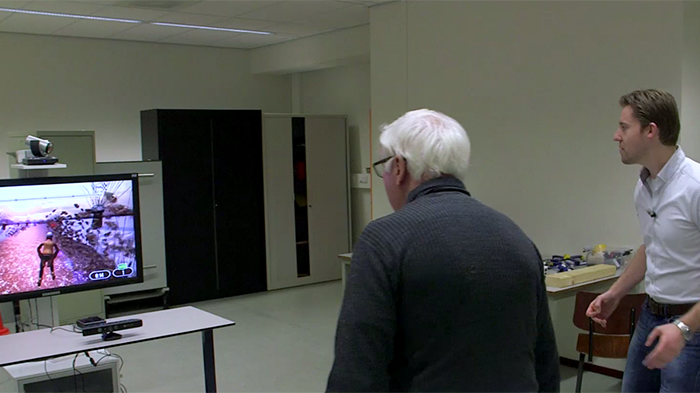Exergame om balans ouderen te trainen
Promovendus Mike van Diest (researchcentrum SPRINT/UMCG/INCAS³) heeft een game ontwikkeld waarmee ouderen thuis hun balans kunnen verbeteren. Zo kunnen valincidenten beter voorkomen worden. Met de game maken ouderen voor de tv schaatsbewegingen. Een camera registreert dat en toont hun bewegingen in een virtuele schaatstocht op het tv-scherm. Zo trainen ze uithoudingsvermogen en coördinatie.
Na zes weken drie maal per week een half uur oefenen blijkt de balans bij een deel van de ouderen daadwerkelijk verbeterd. De onderzochte ouderen waren zeer enthousiast. Sommigen waren zo fanatiek dat ze zelfs meer oefenden dan nodig was. De game wordt nu verder ontwikkeld en wordt wellicht op de markt gebracht.
- Contact: via persvoorlichting UMCG, tel 050 - 361 2200
- Projectleider: dr. Claudine Lamoth
- Meer informatie: http://www.imdi-sprint.nl/huidige-projecten/exergaming-project/

Video’s RUG
Het online videomagazine Unifocus belicht wekelijks onderwerpen die annex zijn met de Rijksuniversiteit Groningen, op het gebied van onderzoek (en samenleving), studentenleven, onderwijs, beleid en internationalisering. Andere video's staan in onze videoportal.
Meer nieuws
-
26 februari 2026
Vici-beurs voor hoogleraar Neurologie Marieke Wermer
-
17 november 2025
Kunstmatige intelligentie in de zorg
-
04 november 2025
AI-Fabriek in Groningen zorgt voor digitale soevereiniteit
